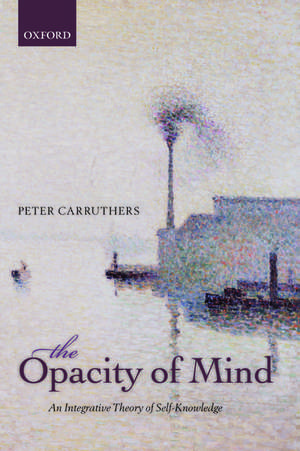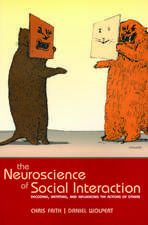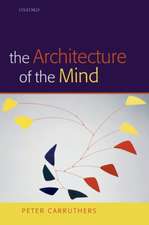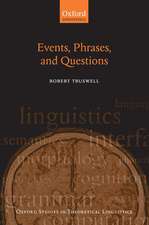The Opacity of Mind: An Integrative Theory of Self-Knowledge
Autor Peter Carruthersen Limba Engleză Paperback – aug 2013
Toate formatele și edițiile
| Toate formatele și edițiile | Preț | Express |
|---|---|---|
| Paperback (1) | 98.41 lei 31-38 zile | |
| OUP OXFORD – aug 2013 | 98.41 lei 31-38 zile | |
| Hardback (1) | 504.43 lei 31-38 zile | |
| OUP OXFORD – 15 sep 2011 | 504.43 lei 31-38 zile |
Preț: 98.41 lei
Preț vechi: 108.35 lei
-9% Nou
Puncte Express: 148
Preț estimativ în valută:
18.83€ • 19.66$ • 15.58£
18.83€ • 19.66$ • 15.58£
Carte tipărită la comandă
Livrare economică 24-31 martie
Preluare comenzi: 021 569.72.76
Specificații
ISBN-13: 9780199685141
ISBN-10: 0199685142
Pagini: 456
Ilustrații: Illustrations
Dimensiuni: 157 x 235 x 25 mm
Greutate: 0.64 kg
Editura: OUP OXFORD
Colecția OUP Oxford
Locul publicării:Oxford, United Kingdom
ISBN-10: 0199685142
Pagini: 456
Ilustrații: Illustrations
Dimensiuni: 157 x 235 x 25 mm
Greutate: 0.64 kg
Editura: OUP OXFORD
Colecția OUP Oxford
Locul publicării:Oxford, United Kingdom
Recenzii
The Opacity of Mind is a terrific book. In a nutshell, the plot is this: Gilbert Ryle meets contemporary cognitive science, and together they produce a novel and exciting theory of self-knowledge . . . This hardly scratches the surface of Carrutherss rich and thought-provoking book. Many other topics are discussed at length: mental architecture, inner sense theories, third-person mindreading, alleged dissociations between self- and other-knowledge, the evidence for widespread confabulation, and much more. As is usual with Carrutherss work, the book is packed with numerous references to the empirical literature--a welcome corrective to work on self-knowledge which blithely disregards it. The Opacity of Mind contains much to disagree with, but also much to learn.
The Opacity of Mind offers a vigorous defense of the startling view that self knowledge is based on error prone inferences from sensory experience rather than direct access to what we are thinking. Drawing heavily on cognitive science, Carruthers makes his radical thesis look eminently reasonable, and he delivers fatal blows to the competition.
In this terrific book, Peter Carruthers aims to show that current theories of our knowledge of our own mental states dont sit at all well with our best theories of how the mind works. Carruthers also proposes and defends a radical alternative theory, which he succeeds in lending an impressive degree of support with appeal to both philosophical argumentation and a wealth of considerations drawn from recent work in cognitive science and related areas. In doing so, he offers a model of how an enduring and central philosophical issue can be fruitfully engaged in an empirically-informed manner. Philosophers of mind and epistemologists continue to be fascinated by our knowledge of our own mental lives; such readers will be fascinated by Carrutherss book, whether or not they agree with its deeply revisionary conclusions.
The Opacity of Mind is a challenging and provocative book, informed by an extraordinary knowledge of scientific psychology and cognitive science. Carruthers certainly places a formidable burden on anyone challenging the key ideas of the ISA theoryin particular, to anyone who wants to maintain any sort of transparent access to propositional attitudes.
Carruthers offers a robust antidote to dominant views about self-Knowledge. In particular, Carruthers bracingly takes aim at any theory of self-knowledge on which we have transparent introspective access even to our current propositional attitudes and affective states. ... a challenging and provocative book, informed by an extraordinary knowledge of scientific psychology and cognitive science.
The Opacity of Mind offers a vigorous defense of the startling view that self knowledge is based on error prone inferences from sensory experience rather than direct access to what we are thinking. Drawing heavily on cognitive science, Carruthers makes his radical thesis look eminently reasonable, and he delivers fatal blows to the competition.
In this terrific book, Peter Carruthers aims to show that current theories of our knowledge of our own mental states dont sit at all well with our best theories of how the mind works. Carruthers also proposes and defends a radical alternative theory, which he succeeds in lending an impressive degree of support with appeal to both philosophical argumentation and a wealth of considerations drawn from recent work in cognitive science and related areas. In doing so, he offers a model of how an enduring and central philosophical issue can be fruitfully engaged in an empirically-informed manner. Philosophers of mind and epistemologists continue to be fascinated by our knowledge of our own mental lives; such readers will be fascinated by Carrutherss book, whether or not they agree with its deeply revisionary conclusions.
The Opacity of Mind is a challenging and provocative book, informed by an extraordinary knowledge of scientific psychology and cognitive science. Carruthers certainly places a formidable burden on anyone challenging the key ideas of the ISA theoryin particular, to anyone who wants to maintain any sort of transparent access to propositional attitudes.
Carruthers offers a robust antidote to dominant views about self-Knowledge. In particular, Carruthers bracingly takes aim at any theory of self-knowledge on which we have transparent introspective access even to our current propositional attitudes and affective states. ... a challenging and provocative book, informed by an extraordinary knowledge of scientific psychology and cognitive science.
Notă biografică
Peter Carruthers is Professor of Philosophy at the University of Maryland. He has published widely across different areas of philosophy of mind and cognitive science. His books include The Architecture of the Mind: Massive Modularity and the Flexibility of Thought (Oxford University Press, 2006), Phenomenal Consciousness: A Naturalistic Theory (Cambridge University Press, 2000), and seven co-edited collections of original interdisciplinary essays.















